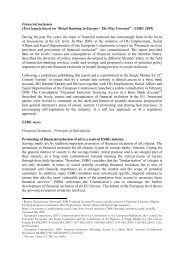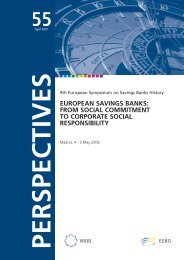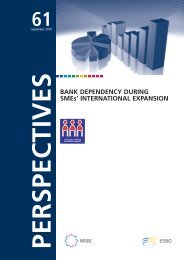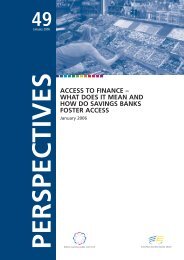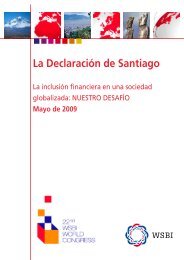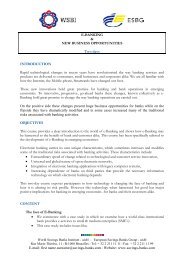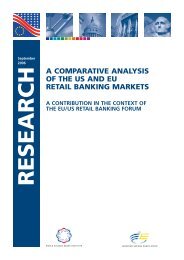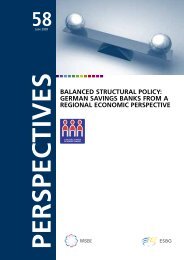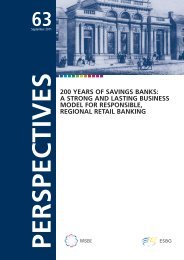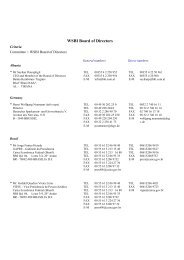Corporate Governance and Access to Finance - ESBG
Corporate Governance and Access to Finance - ESBG
Corporate Governance and Access to Finance - ESBG
Create successful ePaper yourself
Turn your PDF publications into a flip-book with our unique Google optimized e-Paper software.
nnIt seems natural <strong>to</strong> assume that <strong>Corporate</strong> <strong>Governance</strong> practicesof WSBI members are linked <strong>to</strong> their <strong>Access</strong> <strong>to</strong> <strong>Finance</strong> objective.The interactions between these two aspects, however, have neverbeen explored, despite the fact that the role of WSBI members in<strong>Access</strong> <strong>to</strong> <strong>Finance</strong> <strong>and</strong> their compliance with <strong>Corporate</strong> <strong>Governance</strong>practices are well established. This study therefore looks at thepotential impact of the <strong>Corporate</strong> <strong>Governance</strong> model of memberbanks on their cus<strong>to</strong>mer outreach, trying <strong>to</strong> address questions like thefollowing: To what extent is <strong>Access</strong> <strong>to</strong> <strong>Finance</strong> influenced by <strong>Corporate</strong><strong>Governance</strong> practices or other fac<strong>to</strong>rs? Are there specific <strong>Corporate</strong><strong>Governance</strong> practices supporting the compliance with the <strong>Access</strong> <strong>to</strong><strong>Finance</strong> m<strong>and</strong>ate? Which <strong>Corporate</strong> <strong>Governance</strong> practices contributethe most <strong>to</strong> financial inclusion (or the fight against financial exclusion)?To address these issues a questionnaire was circulated <strong>to</strong> WSBI members,<strong>and</strong> five case studies were analyzed- Sparkassen Finanzgruppe inGermany, Kenya Post Office Savings Bank, FEPCMAC (FederaciónPeruana de Cajas Municipales de Ahorro y Crédi<strong>to</strong>) in Peru, the PostalSavings Bank in the Philippines <strong>and</strong> the Cajas de Ahorros (savingsbanks) grouped in CECA (Confederación Española de Cajas de Ahorro)in Spain. A review of the literature was also conducted (see Annex 1).The link between <strong>Corporate</strong> <strong>Governance</strong> <strong>and</strong><strong>Access</strong> <strong>to</strong> <strong>Finance</strong>n<strong>Corporate</strong> <strong>Governance</strong> can be defined in very broad terms as themechanisms connecting (i) the interests of the company’s owners <strong>and</strong>other stakeholders <strong>and</strong> (ii) the way its board of direc<strong>to</strong>rs <strong>and</strong>management exercise their functions (see OECD, 2004). In the case offinancial institutions, <strong>Corporate</strong> <strong>Governance</strong> presents a number ofspecificities as a result of their systemic relevance, their dependence ontrust of the clients <strong>and</strong> the public at large <strong>and</strong> the fact that they aresubject <strong>to</strong> strict regulation <strong>to</strong> limit risk assumption. All this implies thatthe interests of other stakeholders (different from shareholders), likedeposi<strong>to</strong>rs, taxpayers <strong>and</strong> employees, are particularly relevant for financialinstitutions, as illustrated by the global financial crisis. Given theirinstitutional configuration, WSBI members are particularly sensitive <strong>to</strong>a wider group of stakeholders, compared <strong>to</strong> commercial banks.10



